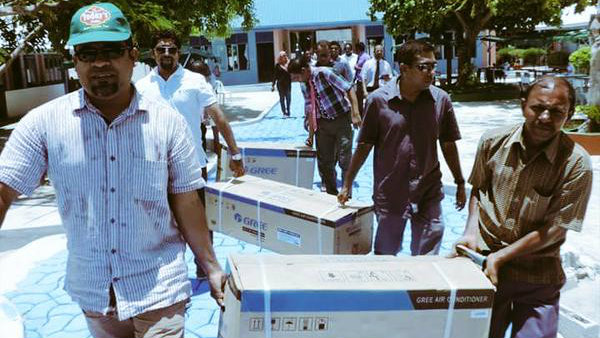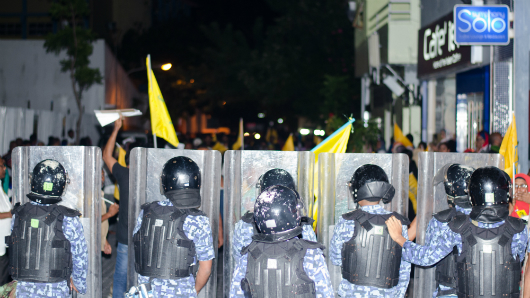The ruling Progressive Party of the Maldives (PPM) has won a council by-election in Raa atoll Alifushi amid accusations of vote-buying and a high-profile handout of air-conditioners to the local school.
PPM candidate Aminath Ali won 685 votes at the by-election held on Saturday, while Ali Hameed, the candidate from the main opposition Maldivian Democratic Party (MDP), received 490 votes of a total 1175 valid votes cast.
However, the MDP said it had not been a fair fight, as members of the PPM had donated air-conditioners and cash to the island school shortly before the vote. They also alleged that vote-buying had taken place.
The MP for Alifushi constituency, Mohamed “Bigey” Rasheed Hussein, told Minivan News: “PPM did not campaign. They bought votes and used tactics of anti-campaigning.”
A government delegation that included ministers and parliamentarians visited Alifushi two weeks before the by-election and handed MVR 10,000 from First Lady Fathimath Ibrahim to the island school, while presenting the donation of air-conditioners.
Asked about the air-con systems, Ahmed Nihan, leader of the PPM parliamentary group, said: “The ACs were gifts from Abdul Raheem Abdulla [vice president of the PPM].”
“Members giving out gifts is not intended for corruption or to influence the election,” he added.
Nihan said that MPs being socially involved and helping citizens did not constitute a reason to accuse them of corruption, and denied any connection with the vote.
The PPM’s election win in an opposition stronghold parliamentary constituency indicated the growing support for the government, despite the recent coalition between MDP and former PPM allies, the religious conservative Adhaalath Party and Jumhooree Party.
“This is a government win over the MDP, Adhaalath Party and the Jumhooree Party, over all opposition parties. We are very proud since we won this election at a time when all of these parties were on the island campaigning against us,” PPM deputy leader and tourism minister Ahmed Adeeb said.
Congra PPM/MDA for winning Alifushi seat against MDP/JP/Adhaalath candidate,Thank u HEP @maumoonagayoom & HEP Yameen! pic.twitter.com/yWWaPXpsR2
— Ahmed Adeeb (@Ahmed_Adeeb) April 4, 2015
A landmark study by the International Foundation for Electoral Systems (IFES) found last year that more than one in three Maldivians were offered bribes for their votes or witnessed vote buying in the March 2014 parliamentary polls.
It said vote buying in the Maldives had assumed “alarming proportions”.
Accusations also surrounded a visit by Ahmed Sulaiman, president of the elections commission, to Alifushi, with the MDP claiming he was involved in door-to-door campaigning for the PPM.
According to Rajje.mv, the elections commission said Sulaiman was at Alifushi on an official visit and that they had no knowledge of wrongdoing.
Did the Commisioner who went to Alifushi not find problem with PPMs distribution of money n goods @ElectionsMv pic.twitter.com/EJ6CTgvcuw
— Hudha (@AhmedHudha) April 5, 2015
During the campaigns, the two parties traded blows over the unfulfilled promise of a sewerage system for the island, with PPM representatives blaming Rasheed, the MP, who voted against the overall government budget in parliament.
Rasheed said, however, that it was down to the government to fulfil its promise of a sewerage system. “They should work according to their word,” he said.
Rasheed said he did not believe vote-rigging could have taken place on by-election day, as observers from both parties were present at polling stations.
PPM president Maumoon Abdul Gayoom, who was president of the Maldives for 30 years until 2008, congratulated the PPM candidate via Twitter, saing: “Warm congratulations PPM candidate Aminath Ali on a resounding victory in Alifushi council by-election today.”
The councillor’s position on Alifushi became vacant when Abdul Latheef Abdul Raheem, also with the PPM, resigned.
PPM will be holding a firework display, its customary celebration, on Alifushi tonight.





